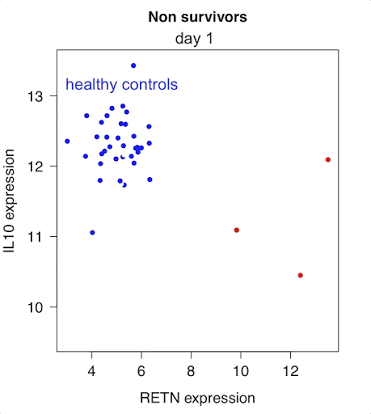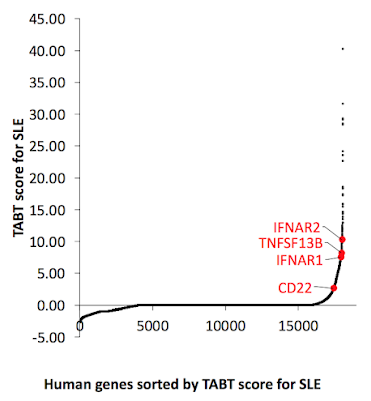
Sepsis
We are working on developing a dynamic model of immune response to systemic infection leading to sepsis. In collaboration with Dr. Nair group at UCR and the RUHS ICU clinical group we focus on early stages of sepsis caused by Gram negative bacterial species, especially urinary tract E. coli. We hypothesize that early stages of the host immune response and specifically the dynamics of changes in the immune cell populations that define a trajectory leading away versus back to the equilibrium are critical for the outcome in the later stages of sepsis. In this proposal we aim to collect a unique set of longitudinal blood samples from sepsis patients, focusing on a frequent sampling of early phases of sepsis and to develop a novel approach to describe and, eventually, predict dynamics of sepsis progression by a computational modeling.
Learn moreAutoimmune Diseases
We developed an empirical Therapeutic AntiBody Targets (TABT) score to identify potential targets in autoimmune diseases. The TABT score integrates information from genome wide association studies (GWAS), disease-related gene expression changes and distribution of expression in tissues, combined with protein-protein interaction network and protein localization prediction. We show that for the four major autoimmune diseases confirmed targets of therapeutic antibodies are within the top few percent of proteins when ranked by the TABT score and, at the same time, the top of the ranking contains hundreds of potentially promising new targets. A score like this can streamline the search for novel drug targets, limit the cost of experimental screening, and improve our understanding of the significant and still growing health problem posed by autoimmune diseases.
Learn more

Cancer
We study changes in immune cells distribution patterns between current smokers and never-smokers. Role of smoking in cancer emergence by genotoxic effect of nicotine and other compounds in cigarette smoke is well studied and results in smoker-specific mutation signatures. But smoking also affects the immune system of the smoker and we hypothesize that this can also affect immune response to cancer in smokers. Our re-analysis of TCGA data suggests that this is indeed the case and moreover, this effect is much stronger in female smokers.
Learn more